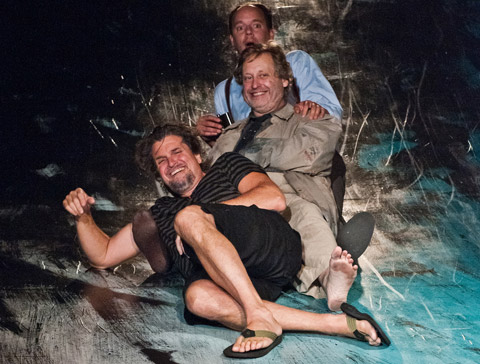
COMEDY THAT SWINGS The actors in the ASP production of Twelfth Night bring fresh rhythms and comic ease to familiar jokes. |
The challenge in any production of Twelfth Night isn't the love triangle — Viola, dressed as a male page, Cesario, is in love with her master, Duke Orsino, but he sends her to woo Countess Olivia for him, and she falls for Cesario. It's the subplot involving the clowns, Olivia's entourage, who conspire to get revenge on her spoil-sport Puritan steward Malvolio. In most editions of this play the clowns' scenes are broadly overplayed, straining to be hilarious. But in the Actors' Shakespeare Project's briskly paced Twelfth Night at the Boston Center for the Arts (through October 22), directed by Melia Bensussen, the scenes involving Olivia's uncle Sir Toby Belch (James Andreassi), her fool Feste (Steven Barkhimer), her gentlewoman Maria (Paula Langton), servant Fabian (Gabriel Graetz), and the ridiculous Sir Andrew Aguecheek (Doug Lockwood), a prize idiot Toby encourages to woo Olivia, are performed with marvelous comic ease. This quintet of actors finds fresh rhythms in the familiar jokes. Lockwood gets his humor out of Aguecheek's nerdy earnestness. Barkhimer is an intellectual Feste, mining the somewhat obscure scholarly language rather than skimming over it — a risky choice that pays off in wit.Oddly enough, it's the comic scenes requiring the least push that feel the most fussed over in this production: Olivia's wooing of Viola and the centerpiece sequence where Malvolio, who is "sick of self-love," opens the letter of adoration Maria has written to him in her mistress's hand. As Olivia, Mara Sidmore mugs through a flirtation that Shakespeare wrote with delicacy; she attacks the role of the love-struck countess as if she were one of the lovers in A Midsummer Night's Dream.
And though Allyn Burrows, the company's artistic director, gives Malvolio some fine shadings in his early scenes — domineering and decidedly mean-spirited with those he calls "the lighter people," he's anxious around Olivia and palpably ill-at-ease in his own skin — he loses all sense of proportion in the letter scene and the follow-up, where he makes an ass of himself by dressing and behaving according to the letter's instructions. Burrows, a terrific actor, may simply not be at home with farce, but in any case his physical and vocal choices (like a Bert Lahr-style growling laugh) don't work at all. You wait impatiently for this Malvolio to return to himself in the final scenes of the play.
The downstage right section of Cristina Todesco's set consists of a slide that the characters keep falling down — a clever visual representation of Illyria, the play's setting, as a state of confusion, where identities are lost and improbable romantic pairings abound. Todesco also included a pool (really a sort of miniature moat) that Bensussen gets good mileage out of but that sometimes feels like an obstacle the actors have to keep negotiating. The abstract expressionist style of the scene painting is carried into the jackets Molly Trainer designed for Viola (Marianna Bassham) and her twin brother Sebastian (Jesse Hinson). Benussen does something conceptual and incoherent with the doubling of these two characters, who are often on stage together echoing each other's lines, but it's a minor problem. Hinson brings a frat-boy charm to his role, and Bassham is an excellent Viola, whether she's countering Olivia's advances, deflecting the aggressive hijinks of the countess's household or conveying the push-pull of Viola's interplay with Orsino (Jason Bowen).
Shakespeare saved his most musical language for these two characters, and the actors serve him well. And it's worth noting that in this Twelfth Night the actual music — sung mostly by the clowns and played by Graetz and Barkhimer (who's also the music director) – sounds beautiful.